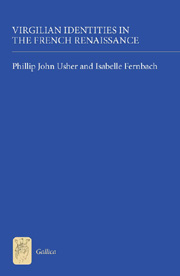Introduction
Published online by Cambridge University Press: 05 February 2013
Summary
Virgil's three main texts – the Eclogues (or Bucolics), the Georgics and the Aeneid – were widely read in Renaissance France. Despite this fact and although many recent studies demonstrate a renewed interest in the ways that Virgil has been read, translated and appropriated in different places and at different periods, to this day no monograph has been dedicated to Virgil's place in sixteenth-century france. The most complete study to date is an article by Alice Hulubei published in 1931, a thorough account that nevertheless awaits a successor. The essays of the present study, a partial and far from exhaustive response to this lack, investigate authorial, political and communitarian models by tracing how authors in sixteenth-century France read, interpreted and translated Virgil's three works. Such an undertaking seems to call for a framework that relates (to) the three different Virgilian genres. The history of Virgilian criticism suggests that we might turn to the medieval interpretive tool of the Rota Virgilii (Wheel of Virgil), which posits an alignment between virgil's three modes (pastoral, georgic, epic), three spaces (countryside, field, town or city/nation), three trees (beech, fruit-tree, laurel or cedar), three implements (crook, plow, sword), three animals (sheep, cow, horse), and three corresponding social ranks (shepherd, farmer, soldier). The rota would seem a particularly pertinent tool here, for it schematizes the connections between Virgil's works and questions of form and function that have to do precisely with authorial, political and communitarian identities.
- Type
- Chapter
- Information
- Virgilian Identities in the French Renaissance , pp. 1 - 16Publisher: Boydell & BrewerPrint publication year: 2012



